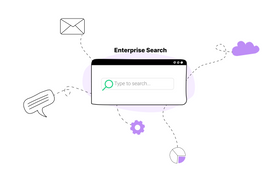Enterprise Search Software: Key Features & Benefits
Updated August 16, 2023

An enterprise search engine is essentially a technology that enables employees to easily find the information they need within the organization, whether through email, databases, file shares, document or content management systems.
Businesses are constantly collecting vast amounts of data, making it difficult to find relevant information. However, enterprise search engines shorten the time it takes to find data, allowing employees to focus on higher-value tasks. Keep reading to find out all you need to know about this innovative technology and how to optimize your enterprise search capabilities.
How to Use an Enterprise Search Engine
According to McKinsey's estimates, a typical digital worker spends approximately 28% of their time looking through email and 20% of their time looking for internal information or tracking down colleagues who can assist them. We all know that time is money, but that's even more true in enterprises. In fact, the International Data Corporation found that companies with 1,000 knowledge employees waste $48,000 per week due to information retrieval issues.
To prevent such waste, organizations can use enterprise search engines to improve their search capabilities, allowing employees to look for information anywhere in the organization, even if it’s scattered across multiple databases or file systems. Enterprise search engines index all of the information in a business's intranet, databases, and file shares. Here are some common use cases for an enterprise search engine
✶ Does your company need enterprise search or federated search?
Knowledge Management
Most businesses have a lot of information, so enterprise search engines are most commonly used as internal company search engines to facilitate looking up and managing that information. To simplify knowledge management, enterprise search engines allow finding and gathering data across multiple systems to do an intranet search for an improved employee experience.
✶ Learn how to develop a knowledge management strategy
E-Commerce and Customer Service
In addition to presenting customers with products they're most likely to purchase on an e-commerce website, an enterprise search engine can also provide businesses with data about customers' past purchases and purchasing habits.
Also, if a customer has a problem, an enterprise search engine will enable a customer service representative to quickly find the solution.
Finding Contacts
An enterprise search engine efficiently finds the contacts you need by looking through name fragments and providing results for names with similar spellings.
Recruitment
Large companies will have a huge pool of candidates in their databases, which can be difficult to navigate. Enterprise search engines can be used to search and match applications with job descriptions, speeding up the process of finding the right applicant for the job.
Insight Engines
Enterprise search engines equipped with AI should be able to detect insightful relationships between data points, whether that’s people, content, or other data. However, with so many enterprise search engines available, it's essential to choose the right engine for your business and configure it correctly to provide value to your business.
We’ve established that data needs to be accessible, but you don’t want any corporate information to get into the wrong hands. To safeguard your data, your organization should implement secure enterprise search software that will encrypt data, have ways to send alerts and detect intrusions, and protect information with access authentication.
✶ Discover the key differences between enterprise search and web search
The Benefits of an Enterprise Search Engine
Enterprise search engines not only make it easier to access data, but they also help organizations centralize information and reduce data silos. Here’s a closer look at the five benefits of enterprise search engines for your organization.
1. Improved Productivity
On average, employees spend almost 2 hours daily just searching and gathering information, which amounts to over 9 hours per week that could be spent focusing on tasks or improving their skills instead.
Having an effective enterprise search engine can also empower employees to act independently since they won't have to seek help from coworkers as much. In addition, they'll be more productive since enterprise search engines allow users to refine their queries.
2. Increased Collaboration
Enterprise search engines make it easy for any employee to stay up to date on any information in the company. They'll also be able to share what they know with their coworkers, which will help them work together better and reduce miscommunications.
3. Enhanced Decision-Making
Organizations face many challenges that require swift, data-driven decision-making. Without access to accurate information, workers are unable to move freely and may even perform worse, which has a detrimental impact on the organization as a whole.
4. Reduced Data Silos
Data silos hamper collaboration and knowledge sharing. When data is locked away from users who need it, the organization suffers from duplicated or fragmented data, flawed decision-making, and lowered productivity. One way to reduce data silos is to implement an enterprise search solution and enable employees to search across all the data repositories in the organization, including internal and external sources.
✶ Why are data silos problematic? See the answer and ways to fix them
5. Refined Data
Enterprise search engines are designed to centralize information. When employees have access to accurate information, the organization can uphold its data integrity. This means data stays consistent, and employees get information from one true source, which is a massive benefit for businesses of all sizes, especially larger organizations with vast amounts of data.
6. Efficient Time Savings
An enterprise search engine offers a significant time-saving advantage for organizations. It swiftly locates vital information from various sources, eliminating manual searches, thus reducing the amount of time employees spend searching for information. This efficiency frees up time for essential tasks.
7. Accuracy
Another valuable benefit of enterprise search engines is their accuracy, which minimizes the risk of errors and enables users to quickly access the most relevant and up-to-date information. As a result, decision-making becomes more informed and reliable, fostering better outcomes for businesses.
Types of Enterprise Search Engines
There are two primary types of enterprise search engines: on-premises and cloud-based solutions. Choosing between these types depends on factors like data sensitivity, resource availability, and scalability needs.
- On-premises search engines are deployed within an organization's local infrastructure. They offer direct control over data and security but require maintenance and hardware resources.
- Cloud-based search engines, on the other hand, operate remotely on cloud platforms. They offer scalability, reduced maintenance, and accessibility from anywhere. Cloud-based solutions leverage the cloud provider's infrastructure and offer seamless updates.
Key Features of an Enterprise Search Tool
Now that we’ve outlined the many benefits of this technology, here are some key features to look for in an enterprise search tool:
1. Scalability
If your organization is growing rapidly or acquiring high volumes of data, the enterprise search engine you choose must be able to scale accordingly.
2. Semantic Search
Semantic search is a useful enterprise search engine feature for organizations with plenty of unstructured data. This feature lets the tool understand the context behind an employee’s query and deliver the most relevant results.
3. Data Security
Not all data should be available to all users. To keep this in check, enterprise search engine security features like role-based security authorization restricts data access to authorized users only.
4. Search Analytics
This feature will provide organizations with more than just searching for data—it also offers new insights that can help improve operational efficiency.
5. Smart Recommendations
AI-powered tools recommend results to employees with similar interests and search patterns. This makes their search results more relevant to their current needs.
How Do I Select an Enterprise Search Engine Provider?
Now, how do you implement enterprise search? You’ll first need to choose the right enterprise search engine provider. To do this, take the following aspects into account:
- Can it accommodate all your files and employees?
- Is it easy to use?
- Can it return the most relevant results first?
- Can users customize the search results based on their needs?
- Can users preview documents before clicking?
- Is there a limit to how many documents you can index?
- Can it integrate with your existing systems?
Overall, the best enterprise search engine for you is the one that meets your company's specific needs.
Using an Enterprise Search Engine: The Verdict
If you're wondering whether you should use an enterprise search engine, consider your organization's size, the number of documents you need to index, and the amount of time and money you're willing to invest.
Although a powerful enterprise search tool like Unleash is very useful for large organizations, if you're running a smaller organization or only have a few hundred documents to index, you should be able to get by with a basic search engine.





